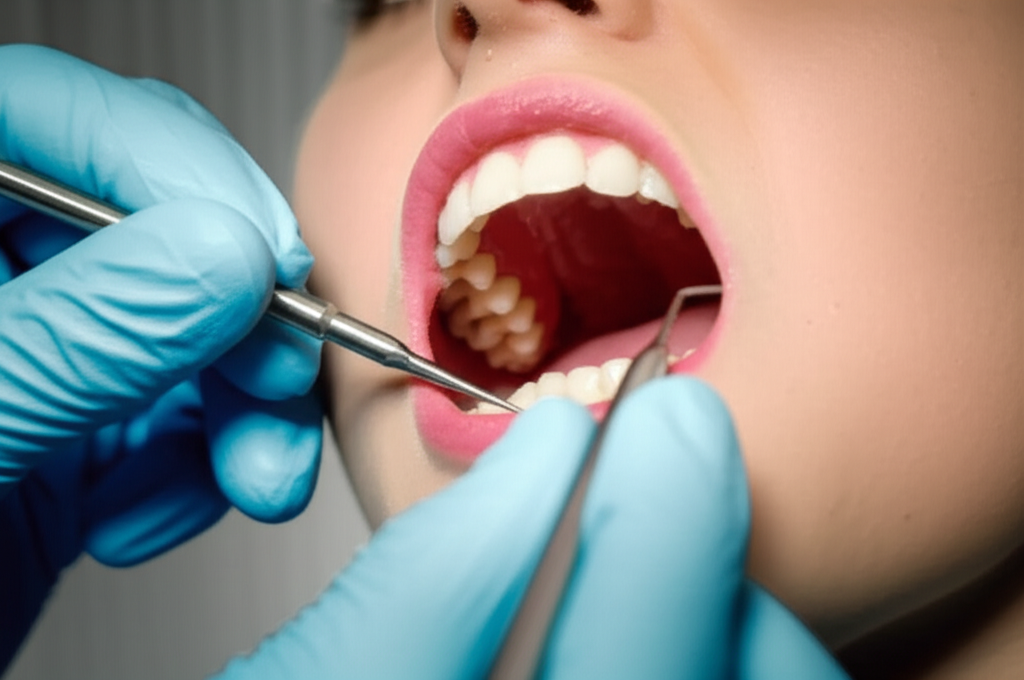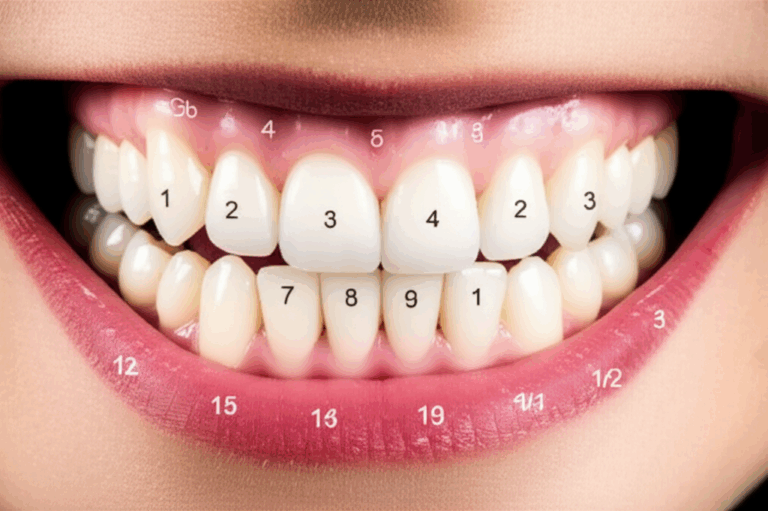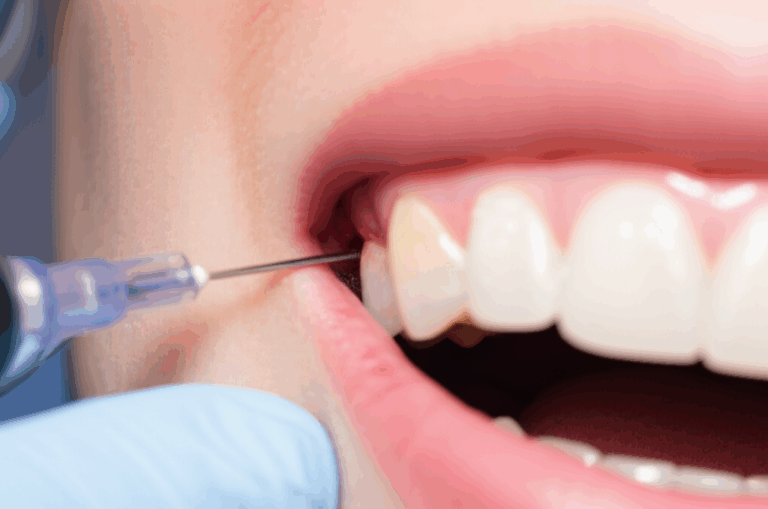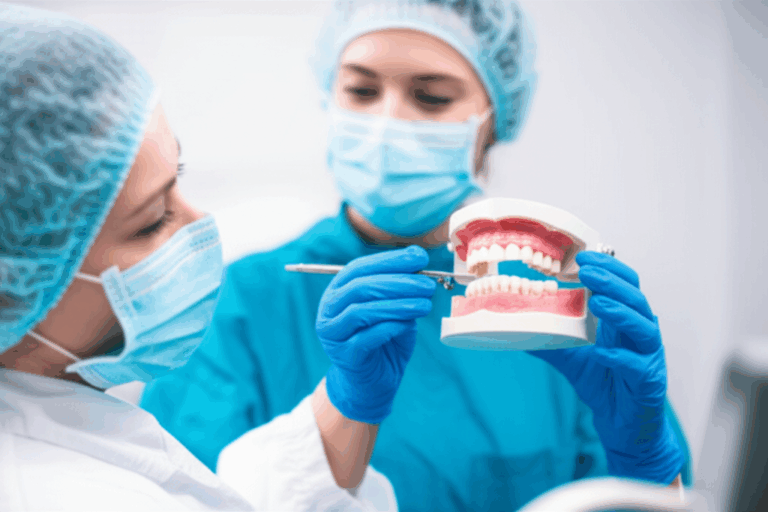
Can a Dentist Do Periodontal Work? Your Guide to General Dentists vs. Periodontists
Short Summary:
Ever wondered if your usual dentist is the one to help with your gum disease? This article explains what general dentists can do for your gums, when you need a gum specialist, and how to choose the right one to keep your gums healthy. If you want a strong smile and want to avoid bigger problems later, read on.
Table of Contents
What Is Periodontal Disease?
Let’s start with the basics. Periodontal disease means problems with the gums and bone around your teeth. There are two main kinds: gingivitis and periodontitis.
- Gingivitis: This is when your gums look red or bleed easily. The good thing is it’s the early, light stage of gum disease and can be fixed.
- Periodontitis: If gingivitis is not taken care of, it can turn into periodontitis. This is more serious. The infection goes deeper, hurting the bone that holds the teeth in. Over time, teeth can get wobbly or even fall out.
How do you know you might have gum disease? Look for these signs:
- Puffy, red gums
- Bleeding when you brush or floss
- Bad breath that won’t go away
- Gums moving back from teeth
- Loose teeth
Dentists check your gums every visit. They use a tool to measure “pockets” between the teeth and gums. Healthy pockets are 1–3 mm deep. Bigger numbers mean there’s a problem.
Can General Dentists Diagnose Gum Disease?
Yes, for sure! General dentists are taught to notice gum disease during check-ups. In fact, they’re usually the first to see a problem—even before you feel anything is off.
Regular dental exams include:
- Looking at gums for swelling or redness
- Measuring pocket depths (the little spaces)
- Checking x-rays for bone loss
- Asking about things like bleeding or bad breath
General dentists can find gingivitis and often mild or even medium periodontitis. If you have very bad or hard-to-treat gum disease, they’ll send you to a gum expert called a periodontist.
Treating Gingivitis and Early Gum Disease: The Dentist’s Role
So, what happens if your dentist finds gum disease? The good news is, if it’s not bad, they can handle it.
Here’s what your general dentist can do:
- Regular, professional cleanings to take away sticky stuff and tartar
- Showing you the best ways to brush and floss
- Keeping your gums checked at each visit
Gingivitis can go away if you do these things. The aim is to stop the disease before it gets worse.
If your dentist finds early periodontitis, they might suggest a “deep cleaning” called scaling and root planing. This is a stronger cleaning, but you’re still just in the dental office!
What Are Non-Surgical Periodontal Treatments?
Non-surgical treatment sounds fancy, but it’s simple.
- Scaling: The dentist takes off the soft and hard buildup from above and below your gum line.
- Root planing: Then, they make the roots of your teeth smooth, so gums can stick and heal.
Why do this? Plaque and tartar cause swelling. If nothing is done, germs will keep hurting your bone and gums.
Sometimes, dentists use special germs-fighting medicine to clean out the pockets. All this can be done with no surgery, and you’ll go home the same day.
How Do Dentists Perform Deep Cleaning and Periodontal Maintenance?
Deep cleaning, or scaling and root planing, might sound scary, but your dentist will numb your mouth first so you don’t feel pain.
- You might need more than one visit, especially if there’s a lot to clean.
- The dentist uses small tools—sometimes even lasers—to clean all the way down.
- After the deep cleaning, your gums might be sore, but that gets better in a few days.
Once everything is clean, your dentist will set you up for periodontal maintenance. This means more check-ups, deeper cleanings (every 3–4 months), and watching your gum health closely.
It’s like getting regular car service. Skip the tune-ups and bigger problems can start.
When Does a Dentist Refer You to a Periodontist?
Some gum problems are just too much for a regular dentist. Here’s when you’ll likely be sent to a periodontist:
- Pockets deeper than 5–6 mm
- Lots of bone missing on x-rays
- Gums moving back in many spots
- Wobbly teeth or teeth moving
- Gum disease not getting better, no matter what
- Health issues like bad diabetes that make healing tougher
Your dentist’s job is to help you keep your teeth. Sometimes that means sending you to a specialist.
What Makes a Periodontist Different?
A periodontist is like the gum and jaw doctor in dentistry. After dental school, they do three more years of special classes. They deal with gum disease all day.
Periodontists treat:
- Serious or hard gum disease
- Tough cases with a lot of bone loss or gum moved away
- People who need gum surgeries, like gum patches or pocket shrinking
- Patients getting dental implants (which need strong gums and bone)
- People with health problems that make healing harder (like diabetes)
If your problem is worse than what a regular cleaning or deep cleaning can fix, this is the person for you.
Advanced Periodontal Procedures: Who Does What?
Let’s see who does what in gum care.
| Treatment | General Dentist | Periodontist |
|---|---|---|
| Regular cleaning | Yes | Yes |
| Deep cleaning (scaling & root planing) | Yes | Yes |
| Gum surgery (flap, patches) | Sometimes, if simple | Yes |
| Bone repair | Sometimes | Yes |
| Treat big bone loss | No | Yes |
| Dental implants (hard cases) | No | Yes |
If your dentist says you need gum surgery, ask about their training and practice. Some dentists with more classes can do easy gum surgeries, but for hard jobs, you need a specialist.
Labs also help with the final look of teeth and bridges after gum work. For crowns, bridges, or implant teeth, strong support can come from a top crown and bridge lab and an expert implant dental laboratory.
How Do Dentists and Periodontists Work Together?
Think of your gum health team as a relay race.
- The general dentist handles the early checks and simple gum disease.
- When things get harder, they pass the job to the periodontist.
This teamwork gives you:
- The right care at the right time
- A second look, so nothing gets missed
- Special plans for bone and gum repair
Your regular dentist will still keep an eye on your teeth even after a periodontist helps. The goal? To keep your teeth strong, your gums healthy, and your smile nice.
How to Choose the Right Professional for Your Gum Care
Choosing the right person matters. Think about:
- How bad is it? Is the problem mild (a little bleeding), or is there bone gone and wobbly teeth?
- How much have they done this? Ask your dentist if they treat gum disease a lot and if they have taken more classes.
- Are you comfortable? Do you feel okay asking questions? A good dentist listens and explains things simply.
Ask these questions at your visit:
- What level is my gum disease?
- Can you fix this or should I see a periodontist?
- What results should I expect?
- How do I keep my gums healthy after treatment?
Sometimes, things like crowns, ceramic teeth, or bridges are needed after gum work. Then, your dentist may work with a dental ceramics lab or a trusted china dental lab.
Tips to Prevent Gum Disease
It’s much easier (and cheaper) to stop gum disease than fix it!
Your daily plan:
See your dentist for check-ups and cleanings at least two times a year. Your dentist can spot problems early and help you stay healthy.
Conclusion: The Right Path to Healthy Gums
To wrap up, general dentists are great at finding and fixing early gum issues. But when gum disease gets tough, they partner with periodontists to give you the best shot at keeping your teeth for life.
Don’t ignore bleeding gums, bad breath, or wobbly teeth. Catch gum disease early, and you may just need a regular cleaning. Wait too long, and it gets harder (and more expensive).
If you’re unsure who to see, start with your regular dentist. And always ask about lab help for any new teeth or dental work—you want a trusted zirconia or digital dental expert. You can stay in charge of your oral health and keep smiling with confidence.
Summary – What Should You Remember?
- Gingivitis is light and can be fixed; your regular dentist can handle it.
- Periodontitis is deeper; if it’s bad, you may need a periodontist.
- General dentists do regular cleanings, treat gingivitis, and do deep cleanings.
- Tough jobs (gum patches, big surgeries, implants) go to periodontists.
- Labs matter—pick dentists who use trusted dental labs.
- Good home care is key: brush, floss, and visit your dentist.
- Ask questions! Make sure your dentist is right for your gums.
- Don’t wait if you see signs—acting early saves teeth and money.
References:
- Centers for Disease Control and Prevention (CDC) – Periodontal Disease Data
- American Dental Association (ADA) – Gum Disease
- American Academy of Periodontology (AAP) – Treatment Info
- iStar Dental Lab – crown and bridge lab, dental ceramics lab, china dental lab, implant dental laboratory, zirconia lab








